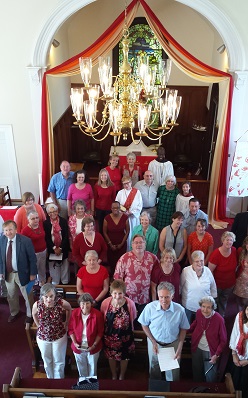About
 Piedmont Episcopal Church is congregation of sinners and saints (most of us are both) that has been meeting for worship, fellowship and mission since 1834.
Piedmont Episcopal Church is congregation of sinners and saints (most of us are both) that has been meeting for worship, fellowship and mission since 1834.
Piedmont may be a small, country church. But we don't let that be an excuse for not giving to God the best we have to offer in our worship and in our ministries. Our commitment to excellence can be seen in the attention given to the beautification of the altar and church, in the quality of music provided by our organist and by the choir, in the commitment of members to giving to the community, in the love and dedication of our Sunday school teachers, and in the support and comfort members provide one another in times of need. We have been blessed over the years to see lives changed by God through us in these ministries.
Our church is part of the Diocese of Virginia, a regional structure under the authority of a bishop, and a member church of the Episcopal Church. The Episcopal Church is part of the Anglican Communion, a family of churches which have been planted throughout the world by the Church of England and who hold similar beliefs, worship practices and church structures. As part of the Anglican tradition, we share in a rich heritage of worship, music, art, and theology.
Piedmont can be described as:
Protestant, yet Catholic
From its beginnings in the Protestant Reformation in the 16th century, Anglicanism has affirmed the Protestant principles of “justification by grace through faith” (we are saved through Christ, not our good works) and the necessity of all believers to read the Bible in their own language. At the same time, Anglican churches preserved certain “Catholic” elements, like the use of Sacraments, the appeal to the teachings of the EarlyChurch, and the Historic Orders of Bishop, Priest and Deacon, as legitimate, divinely inspired developments.
Evangelical, yet Sacramental
As Anglicans, we affirm the centrality of the preached Gospel and also affirm that God continues to use material things—water and oil, bread and wine—to draw believers into the grace-filled life with Himself. Our worship, which consists of both the Service of the Word and the Service of Holy Communion, maintains a balance between Word and Sacrament.
Bible-Believing, yet Culture-Engaging
With Christians across the globe and throughout time, we believe the Bible to be the revealed Word of God and “the rule and ultimate standard of faith.” More important than what we believe about the Bible, though, is how we use it. In our worship services, we typically read several passages from Scripture, and the vast majority of the prayers and professions found in our Prayer Book are quotes and paraphrases of Scripture. At the same time, we seek to relate the teachings of the Bible to our lives today and to the events of the world. We affirm that God is working in the world, in our culture, in the arts, in politics, to reveal His love and establish the Kingdom of God on earth. Our charge as Christians is to discern where God is at work (and where He is not) and to share with God in that work.
Ancient, yet Modern
Our Prayer Book contains prayers and blessings as old as the 6th-century BC and as modern as the 20th century. Likewise, the songs we sing range from hymns from the 3rd century to praise songs written in the past decade. While rooted in the ancient Christian tradition, we seek to utilize the best gifts available to us, in our effort to present the truth of the Gospel as relevant to the needs of today.
Country, yet Cosmopolitan
We are situated in a largely rural community, yet many of our members come from urban and suburban areas. These members—teachers, business owners, lawyers, servicemen, doctors, homemakers, journalists and retirees—have chosen to move to Madison for the slower pace, for the natural beauty and for warmth of the small town community. So, while valuing the country life, we remain actively engaged with the events and the discussions of the larger world.



